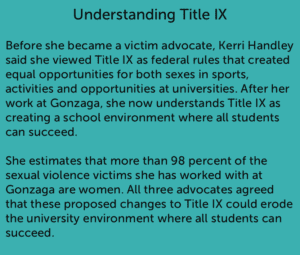Advocates Question Proposed Title IX Changes

The U.S. Department of Education has proposed changes to Title IX of the Civil Rights Acts of 1964 that would alter how universities handle sexual violence. Our victim advocates in Spokane who work with Gonzaga and Eastern Washington Universities are concerned about how those changes will impact victims.
“They are creating more barriers for victims, and there are already plenty of barriers,” said Kristina Poffenroth, who works as a Confidential Victim Advocate at Eastern. Kerri Handley is beginning her third year as Gonzaga’s Confidential Victim Advocate. She works with victims who have experienced sexual violence who attend or work at Gonzaga.
“These changes limit a university’s ability to holistically respond to sexual violence,” Handley said. “They seem to limit areas where they can support students.”
The public has until Jan. 28 to weigh in on the proposed rule changes. Final changes are expected after the comment period closes.
Poffenroth, Handley and Advocacy Supervisor Millini Goodman outlined seven proposed changes to Title IX where they have the biggest concerns. They all agree that university leaders will have decisions to make on how they will support victims if rules change.
Their concerns about proposed changes to Title IX include:
1) Limiting the definition of sexual harassment and misconduct – Incidents would have to be “ongoing and escalating” before a university is required to investigate. Currently, universities must investigate all reports of sexual harassment and misconduct.
2) Increasing the burden of proof from clear and convincing evidence to preponderance of evidence when finding perpetrators responsible. This would make it more difficult to prove sexual violence. “It’s going to be up to the universities in how they respond,” Handley said. “But, they wouldn’t have the backing of Title IX when they deal with different situations, which significantly limits their ability to respond to and support students.”
3) Schools would no longer have to investigate incidents that occur off campus. All kinds of student parties take place off campus, and many students live off campus. Handley estimates that 80 percent of the incidents she has dealt with at Gonzaga have occurred off campus. What happens off campus has a direct impact on a university’s on-campus environment.
4) Schools would be required to allow alleged perpetrators face-to-face cross-examination of a victim. In the legal system, cross-examination is allowed in criminal cases but usually not allowed in civil cases. Direct cross-examination can be retraumatizing for victims.
5) Universities would no longer be required to finish investigations of sexual violence incidents within 60 days, giving a university discretion to decide how long an investigation could take. In the legal system, it can take years for an investigation to conclude. “Our goal is to help victims heal, but it’s difficult for them to heal when there is an open investigation,” Handley said.
6) University faculty and most of the staff would no longer be designated reporters of sexual violence. There would be far fewer people mandated to report sexual violence to at a university.
7) Students who perpetrate sexual violence could claim discrimination under Title IX. A university’s focus could change from the victim to the perpetrator. If the changes to Title IX go through as proposed, universities will save millions in investigation costs. Their liability for sexual violence would be significantly reduced. Advocates say these savings would come at the expense of victims.
Submitting a Comment
The proposed changes to Title IX can be found in the Federal Register. You can make a formal comment on the proposed changes until January 28 by clicking here.

0 Comments